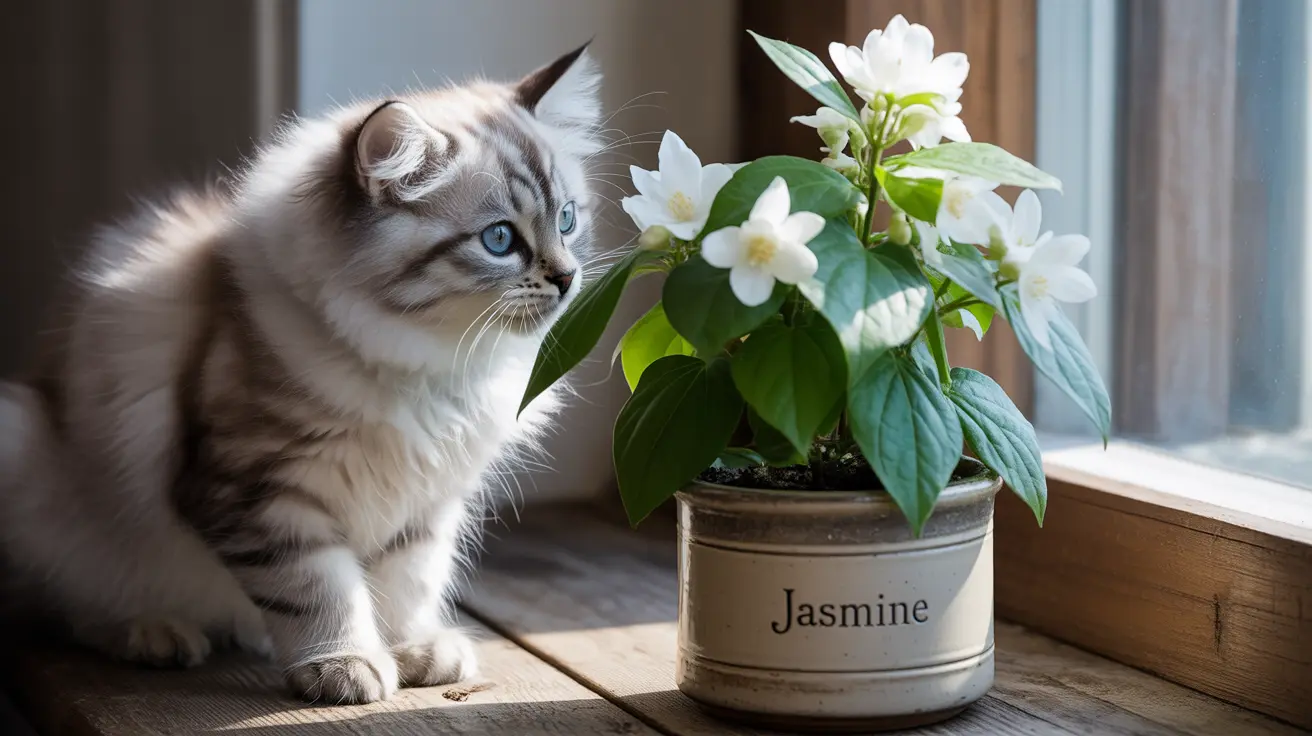For cat owners looking to add fragrant plants to their homes, the question of jasmine safety is crucial. While true jasmine (Jasminum species) is generally safe for cats, several plants marketed as "jasmine" can be dangerously toxic. Understanding these differences could literally save your cat's life.
This comprehensive guide will help you distinguish between safe and dangerous jasmine varieties, recognize potential symptoms of poisoning, and make informed decisions about the plants you keep around your feline friends.
Understanding True Jasmine vs. False Jasmine
True jasmine (Jasminum species) belongs to the olive family and is considered non-toxic to cats by the ASPCA. These fragrant plants can safely coexist with your feline companions, though excessive consumption might cause mild stomach upset.
However, several dangerous imposters are often labeled as "jasmine" in garden centers and nurseries:
- Star Jasmine (Trachelospermum jasminoides) - Non-toxic
- Brazilian Jasmine (Mandevilla sanderi) - Generally safe
- Carolina Jessamine (Gelsemium sempervirens) - Highly toxic
- Crepe Jasmine (Tabernaemontana divaricata) - Toxic
- Cape Jasmine (Gardenia jasminoides) - Toxic
Identifying Toxic Jasmine Species
The most dangerous "false jasmine" is Carolina Jessamine, which contains potent neurotoxins in all parts of the plant. This climbing vine produces yellow, trumpet-shaped flowers and is sometimes sold as "yellow jasmine" or "evening trumpet."
Crepe Jasmine and Cape Jasmine (Gardenia) also pose significant risks to cats. These plants contain different toxic compounds that can cause severe reactions if ingested.
Signs of Jasmine Poisoning in Cats
Mild Symptoms (True Jasmine)
If your cat consumes large amounts of true jasmine, they might experience:
- Mild digestive upset
- Temporary discomfort
- Occasional vomiting
Severe Symptoms (Toxic Varieties)
Watch for these dangerous signs if your cat encounters toxic varieties:
- Muscle weakness or paralysis
- Respiratory problems
- Vision issues
- Difficulty swallowing
- Seizures
- Severe vomiting
- Lethargy or collapse
Prevention and Safety Measures
To protect your cats while enjoying jasmine plants:
- Always verify the scientific name before purchase
- Keep plants out of reach, even safe varieties
- Consider growing true jasmine outdoors only
- Provide cat-safe alternatives like cat grass
- Monitor outdoor cats in gardens containing any jasmine varieties
Emergency Response
If you suspect your cat has ingested toxic jasmine:
- Contact your veterinarian immediately
- Collect a sample of the plant for identification
- Monitor and document your cat's symptoms
- Don't wait for symptoms to worsen before seeking help
Frequently Asked Questions
Is true jasmine (Jasminum species) safe for cats to have around the house?
Yes, true jasmine (Jasminum species) is considered non-toxic to cats by the ASPCA. While excessive consumption might cause mild stomach upset, it poses no serious health risks to your feline companions.
What are the symptoms if my cat eats Carolina Jessamine or other toxic jasmine varieties?
Symptoms include muscle weakness, paralysis, decreased respiratory rate, vision problems, difficulty swallowing, seizures, and potentially death. Immediate veterinary care is crucial if you suspect your cat has ingested toxic varieties.
How can I tell the difference between non-toxic star jasmine and toxic false jasmine plants?
Star jasmine has glossy dark green leaves and white, pinwheel-shaped flowers. Carolina Jessamine has yellow, trumpet-shaped flowers. Always verify the scientific name: Trachelospermum jasminoides (safe) vs. Gelsemium sempervirens (toxic).
What should I do if I suspect my cat has ingested a poisonous jasmine plant?
Contact your veterinarian or emergency animal poison control immediately. Collect a sample of the plant for identification, and monitor your cat's symptoms. Don't wait for symptoms to worsen before seeking professional help.
Are there any jasmine plants that might cause mild stomach upset in cats but are not deadly?
True jasmine (Jasminum species) and Brazilian Jasmine (Mandevilla sanderi) might cause mild digestive upset if consumed in large quantities, but these symptoms are typically not serious and resolve on their own.
Remember, when it comes to your cat's safety, it's better to be overly cautious. If you're unsure about a plant's identity or safety, consult with a veterinarian or certified botanist before bringing it into your home.






